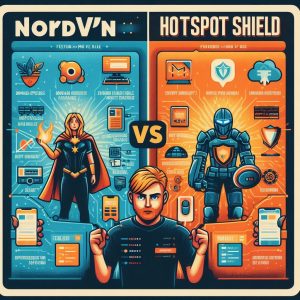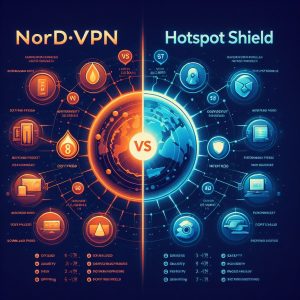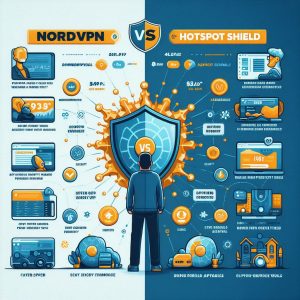Introduction
Choosing the right virtual private network (VPN) is an important decision that can have major implications for your online privacy, security, and accessibility. With so many VPN providers on the market, it can be difficult to determine which one best fits your needs. Two of the most well-known VPN services are NordVPN and Hotspot Shield.
This article provides an in-depth comparison of NordVPN and Hotspot Shield across a number of categories, including pricing and plans, server network and speeds, security features, streaming capabilities, user experience, and more. By evaluating the strengths and weaknesses of each VPN, you will be better equipped to select the right one based on your personal priorities, budget, and use case. Keep reading for a comprehensive analysis to help inform your decision between these two popular services.
Pricing and Plans
Pricing is often one of the first considerations when selecting a VPN. NordVPN and Hotspot Shield offer competitive pricing structures, but there are some key differences in their subscription plans.
NordVPN’s starting monthly price is $11.95, making it a mid-range VPN in terms of upfront cost. With the 2-year plan, the monthly cost drops to only $3.29. NordVPN allows connecting 6 devices simultaneously per subscription, which is generous for individuals and small households. Occasional discounts and seasonal sales help offset the already reasonable pricing.
Hotspot Shield’s monthly pricing starts lower at $7.99/month. Their 1-year plan brings the monthly average to $4.99, while the 5-year plan drops it further to $2.49/month. Support for 5 concurrent connections per subscription is still solid for personal use. Hotspot Shield offers introductory discounts on first-time purchases and through some partner websites.
When it comes to number of devices covered and overall value for money over longer subscription durations, NordVPN compares very favorably to Hotspot Shield’s pricing. Multi-year discounts are steeper for NordVPN, and the extra supported device per plan is a nice benefit, especially for larger families. Both VPNs offer affordable entry points for budget-focused users.

Server Network and Speed
Two essential metrics for evaluating VPN performance are server network reach and connection speeds.
NordVPN has over 5,600 servers located in 59 countries worldwide. This extensive server infrastructure provides more options for accessing geo-blocked content and obscuring your digital footprint. Independent speed tests clock NordVPN at an average of 53Mbps download speeds and 51Mbps upload on nearby servers using the Wireguard protocol. Speeds are consistently fast across short and long-distance connections.
Hotspot Shield has around 1,800 servers in more than 80 countries. While wider global reach is a selling point, fewer servers can result in more congested traffic and slower speeds for users in some regions. Average Hotspot Shield download speed comes in at around 45 Mbps, with upload speeds trailing at 36 Mbps based on third-party evaluations. Speed test results can be inconsistent across locations.
For large server networks that deliver reliably fast connection speeds, NordVPN excels compared to Hotspot Shield’s smaller VPN infrastructure. More server options enhances accessibility without sacrificing speed for NordVPN customers. Both services do enable accessing streaming sites like Netflix and BBC iPlayer. Ultimately NordVPN takes the advantage when it comes to server infrastructure scalability and speed performance.
Security and Privacy Features
Robust security and privacy tools are prerequisite expectations for premium VPN services nowadays. Both NordVPN and Hotspot Shield incorporate advanced encryption and additional protection measures.
NordVPN uses AES-256 bit encryption and supports OpenVPN, IKEv2/IPSec, and WireGuard protocols. These industrystandard encryption and protocols provide a very secure, fast foundation. Beyond encryption, NordVPN operates a strict no-logs policy for user activity and has undergone independent audits to back up its privacy claims. An automatic kill switch, cybersec malware blocking, and onion routing are extra layers of protection and anonymization provided to all users.
Similar to NordVPN, Hotspot Shield relies on AES-256 bit encryption and supports OpenVPN connections. No connection or activity logs are maintained. Unique features include its proprietary Hydra protocol, which camouflages VPN traffic to avoid deep packet inspection. IP and DNS leak protection works to prevent identifiable information exposure. The built-in firewall monitors network traffic as well. No kill switch is available to instantly disable internet access if the VPN connection falters.
For the most robust privacy and security toolbox, NordVPN takes the lead with independently audited no logging policies, an effective kill switch, multi-hop connections via its Double VPN feature, and onion routing. Hotspot Shield still provides very strong encryption and some additional protection tools but lacks a few of the advanced features seen with NordVPN.

Streaming and Torrenting
Unblocking geo-restricted access to streaming platforms and securely torrenting files are two popular use cases for VPNs. Depending on your streaming and torrenting needs, one VPN may be better suited than another.
NordVPN earns impressive marks for reliable access to popular streaming sites like Netflix, Hulu, Amazon Prime Video, BBC iPlayer, Disney+ across a wide breadth of server locations. Freedom to torrent without bandwidth throttling or limits on P2P sharing is also enforced. Specialty NordVPN servers provide extra high-speed streaming and torrenting capabilities as needed.
Similar unblocking abilities for Netflix, Hulu, and other top streaming services are supported using Hotspot Shield. However, access can be inconsistent depending on the server used. BBC iPlayer and some other sites do impose streaming restrictions while connected to Hotspot Shield servers. File sharing activity is officially restricted as well, making NordVPN the superior option for torrent users.
If your usage depends on unlocking geo-blocks on a diverse array of streaming platforms or you want unlimited and protected P2P torrent transfers, NordVPN is better equipped to satisfy those needs right now. Hotspot Shield still works adequately for basic video streaming. Just be aware that some limitations around specific sites and torrenting remain in place on that platform.
User Experience and Interface
Ease of setup and use can factor into which VPN provider leaves the best impression for daily operation. Intuitive design tailored across desktop and mobile platforms makes connecting to the VPN simple for customers of any tech skill level.
NordVPN provides apps for Windows, MacOS, iOS, Android, Linux, and Android TV setup boxes. Manual router installation configuration files are even available. Its interface displays neatly organized server categories like P2P, Double VPN, Obfuscated Servers to quickly identify the best connection for your activity. Servers can be easily searched and favorited to save time finding fast options in frequently accessed locations. NordVPN also offers handy security alerts and notifications to stay informed.
The desktop and mobile apps from Hotspot Shield also cover all major platforms. However, its interface relies more heavily on world region maps rather than server categories or specialty uses to arrange its smaller network. Server connections must be selected manually through search rather than surfacing recommendations based on activity. Alerts mostly center on subscription status rather than security insights. The experience feels a bit more dated and generic compared to NordVPN’s more modern design tailored for power users.
Between its vast platform support, neatly categorized and easily identifiable server connections, customizable alerts, and user-focused design language, NordVPN simply provides a better overall user experience compared to Hotspot’s dated and barebones approach. Intuitive and consistent interfaces across desktop and mobile make NordVPN simpler to set up and operate daily.

Conclusion
NordVPN and Hotspot Shield each offer distinct advantages that appeal to different user preferences and priorities around VPN services. However, when stacked against one another across essential categories from pricing to speeds to features, NordVPN emerges as the leader in nearly every area.
NordVPN combines widespread server availability and fast connection speeds with an independently audited no-logs policy and the most extensive suite of security tools. Unblocking capabilities for video streaming and P2P torrenting alike excel and remain hassle-free. And with NordVPN’s multi-platform support, useful server organization, and activity-based recommendations, getting up and running with an intuitive experience is straightforward.
As an alternative choice, Hotspot Shield still provides decent basic personal VPN coverage with good global reach. But limitations around streaming, torrenting, and speeds—not to mention fewer security safeguards—all fall slightly short of NordVPN’s higher standards for features and performance.
For many VPN users, NordVPN represents the best blend of affordable pricing, excellent speeds, top-tier privacy and security protections, and usability. Minor weaknesses around subscription rates and inconsistent server speeds make Hotspot Shield fall short when compared head-to-head as a viable alternative. By selecting NordVPN over Hotspot Shield, customers are assured an all-around reliable and high-value VPN for safeguarding their digital life across desktop and mobile landscapes alike.